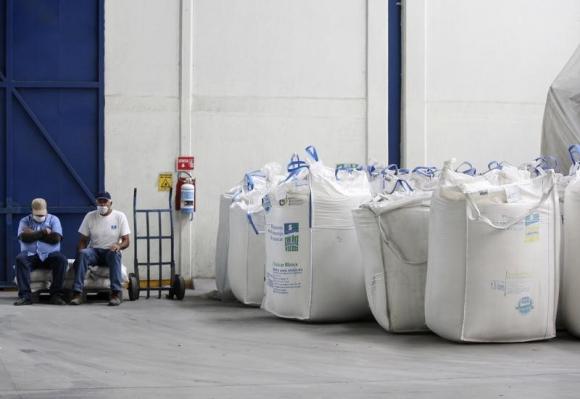 is set to slap import duties as high as 17 percent on Mexican sugar in a victory for the powerful U.S. sugar industry but a blow to U.S. candy and soft drink makers who face paying more for the sweetener.
is set to slap import duties as high as 17 percent on Mexican sugar in a victory for the powerful U.S. sugar industry but a blow to U.S. candy and soft drink makers who face paying more for the sweetener.Mexican producers urged a deal to end the spat while the government hinted at retaliation, highlighting the potential for Tuesday's Department of Commerce ruling to increase tensions in a months-long trade dispute over claims cheap subsidized sugar is flooding the heavily protected U.S. market.
The duties mean companies like sweets and food makers Hershey Co, Mondelez International Inc, General Mills Inc and drinks makers such as Coca Cola Co will have to pay up to 5 cents per pound extra for imported Mexican sugar, based on current prices.
The United States is a net importer of sugar and Mexico is one of its largest suppliers. Mexican imports are estimated at 2.1 million short tons for the 2013/14 crop year that runs through Sept. 30.
The preliminary decision could still be overturned but is only the first stage of a case which could lead to a further round of levies. It underscores the influence that U.S. cane and beet growers, a relatively small but politically engaged sector in U.S. farming, have over domestic farm and trade policy.
Out of a total 2.2 million U.S. farms, less than 4,700 grow cane and beet, according to data from the Washington-based Heritage Foundation, a conservative think tank.
But the sector accounts for a third of the crop industries' campaign donations and 40 percent of crop industries' lobbying expenditures, it said.
Tuesday's decision is a victory for the American Sugar Alliance (ASA), which represents U.S. sugar farmers and processors and has pushed for an end to free trade with Mexico since sweetener was included in the North American Free Trade Agreement (NAFTA) six years ago.
The ASA said on Tuesday it expects final countervailing duties would be even higher than the preliminary decision.
"The finding validates our claim that the flood of Mexican sugar, which is harming America’s sugar producers and workers, is subsidized by the Mexican government," a spokesman said.
Still, one U.S. sugar importer described the duties as "devastating", and warned that U.S. prices would likely rise in line with the new tariff.
U.S. prices are already above the global market because of a government subsidy program that sets minimum prices.
Under the ruling, sugar from state-owned Mexican mills - which account for a fifth of production - will attract duties of 17.01 percent, compared to 2.99 percent for private sector Grupo Azucarero Mexico producers and 14.87 percent for all other producers.
Mexico sugar chamber president Juan Cortina said the industry was prepared to cap exports in exchange for suspending duties, as long as any deal allowed minimum exports of 1 million tonnes per cycle.
The chamber believed a deal could be reached before the U.S. rules on the anti-dumping section of the case in October - which could lead to more duties. U.S. producers claim Mexican sugar is sold at 45 percent or more below fair value.
The U.S. International Trade Commission is also conducting a parallel investigation into whether the imports injure local growers. Its final verdict is due in February.
CONSUMERS PAY THE PRICE
U.S. Agriculture Secretary Thomas Vilsack has said he would encourage a settlement, but U.S. lawmakers, food manufacturers and commercial users of sugar have warned a deal would inflate food prices and threaten U.S. food manufacturers.
"The likely result is that the growers, particularly in the United States, will make more money, and the consumers will pick up the tab," said National Foreign Trade Council president Bill Reinsch.
The Sweetener Users Association said Mexico had become a scapegoat for the failings of the U.S. sugar program and critics argue the case could prompt retaliation against U.S. high-fructose corn syrup.
Mexico's Economy Ministry said the decision was a setback in trade relations and that Mexico will defend its rights and exhaust the legal options to protect its interests under NAFTA and the World Trade Organization.
Concerns about tightening supplies in the United States have pushed domestic prices up 18 percent since the case was filed in March.
Second-month U.S. domestic raw sugar futures traded in New York jumped to a two-week high of 26.75 cents a lb in thin trade after the news but pared the gains by the close.
In the meantime, traders braced for volatile and uncertain trading conditions ahead of the government's decision on antidumping duties on Oct. 24.
"The dumping duty is the big one. This (Tuesday's ruling) should encourage Mexico to try to get a deal, and strengthen the conviction of the (U.S. sugar industry)," said Frank Jenkins, president of Connecticut brokerage JSG Commodities.





